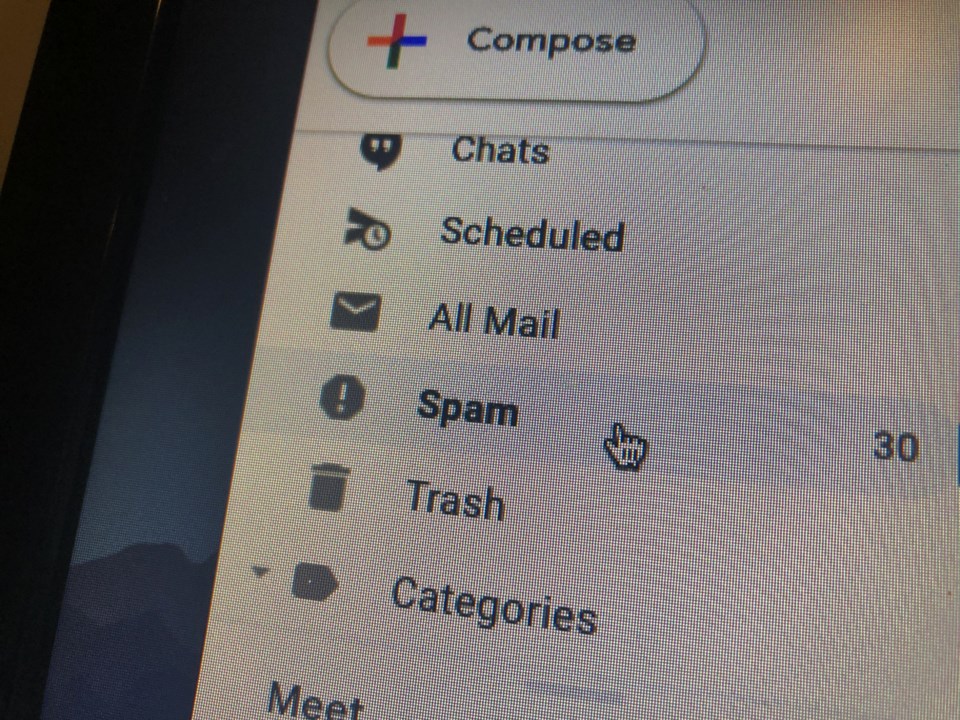This regular column on tips to live more sustainably comes from the 52 Weeks Climate Action Challenge. The challenge was created by Laurel Hood and Sherri Jackson. Hood is a retired Collingwood Collegiate Institute teacher, and Jackson is a writer and speaker, and ran as the Green Party’s candidate for the area in the last federal election. Both are climate activists.
*****
We’ve been together for 40 weeks now. I think I can share some deeply personal information with you. I have a pet peeve. Many, in fact, but, this one relates to this week’s challenge. When I am in a store, take my items to the checkout, and the cashier asks me for my email address.
Now that might not bug some of you. Vive la difference. But for me, it’s right up there with “have a good one.” A good one what, I’m not totally sure, but thanks for the well wishes.
When someone asks me for my email, I smile and say no thank you. But, inside, I’m thinking about all the junk they’re going to send me, all the luring to buy cheap goods at low prices. The drive to consumerism, and the already too much stuff that I am lucky enough to have acquired in my lifetime (I vacillate between an obsessive packrat and Swedish death cleansing). I know that this innocent request translates into consumer reports, data mining and ways to manipulate us into buying more.
In the spirit of a previous challenge where we began cleaning out our emails, this week we’ll go one step further. We’ll avoid amassing all those emails in the first place.
Did you know that 78 per cent of all incoming email is spam? Spam is defined as any unwanted or unsolicited email you receive. About 62 trillion spam messages are sent annually. That’s not the bad news. The bad news is that it requires 33 billion kilowatt hours of energy to power, resulting in 20 million tonnes of CO2 emissions per year. Wow. Just to hear from a Nigerian prince in crisis, or to find out that Old Navy has jeans on sale (again)?
So, what exactly do we do about it?
Challenge 40: Unsubscribe.
Unsubscribe from sites that encourage you to buy things.
Beyond the annoyance of unwanted email, most of these messages simply want you to buy more more more!
Consumerism is alive and well. If we are going to break free of unhealthy habits, we need to consider how much we purchase, whether we need it, and why we want it. Being satisfied with what we have isn’t part of the human condition. In an age where having the newest gadget is all the rage, having offers sent to your inbox makes it all the more difficult to restrain. Compound that by being in lockdown, and you get the picture. You have done a good thing by thwarting temptation!
Email addresses are a valuable commodity for companies trying to get their hands on your wallet. Why? Because they’re a lead. And, unlike the archaic “phone book” where you can look up a person’s name, address and telephone number, there isn’t an “email book” where you can find people’s email addresses. It requires asking directly, or more devious approaches. In essence, it’s harder to get, and when you have it, you have direct access to that person.
There are very few places you can go, online or otherwise, that does not request you to “sign up,” “get free stuff,” or “subscribe.” Why are they giving away such great stuff for free? Because they want your email address!
Handing out your email address willy nilly is not a wise idea. It clogs up your inbox, and leads to the data pollution we talked about before. It also leaves you vulnerable to a bunch of unsolicited information, and scams. Beyond that, there are people actively seeking your email, so they can send you garbage.
Your email gets dispersed through online subscriptions, social media, online forms and scraping tools. This information is purchased by marketers who use it to target you. You can “unsubscribe” from these emails. There must legally be a link at the bottom so you can do this. If there isn’t, many providers (like Gmail) offer you an “unsubscribe” tool at the top of the page. Going through your emails and selecting the ones you really could live without will get the process started.
All in all, junk mail is cluttering up our virtual world, and wasting tons of energy unnecessarily. You can be part of the solution with a few simple steps.
After you unsubscribe, here are some more tips from Norton on how to unclutter your inbox.
- Delete junk mail or messages from unfamiliar senders without opening them.
- Mark spam or advertising as “spam” and report it.
- Keep your email private. Don’t share it with anyone unless absolutely necessary.
- Use a third-party spam filter. There are lots of options out there, some free, some not (like McAfee, Norton, AVG).
- Change your email address or create an address solely for online purchases.
Now that you’re spam free, you’ve done your part for the planet this week. Put your feet up and enjoy a job well done!
*****



